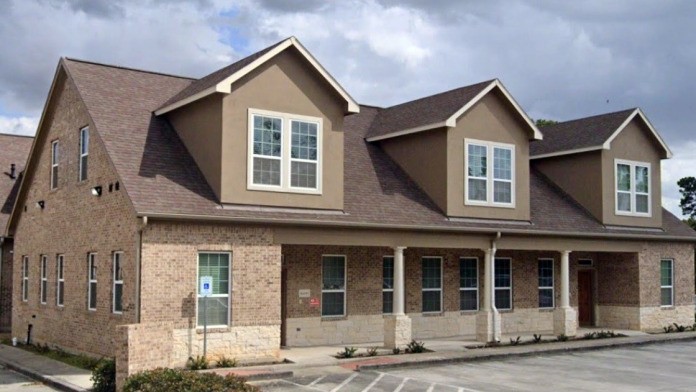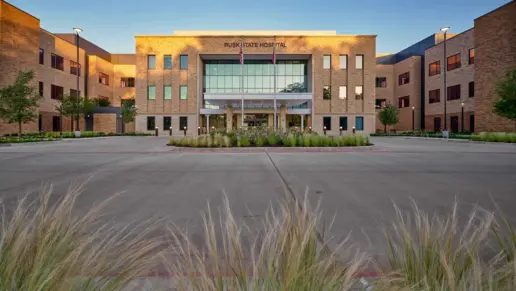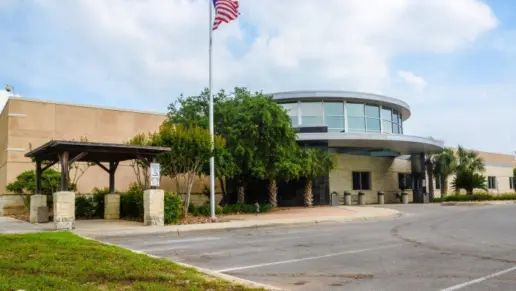About New Dimensions Day Treatment Center – Woodlands Counseling Services
New Dimensions Day Treatment Center – Woodlands Counseling Services is an alcohol and drug rehab in Spring, Texas. They offer partial hospitalization programs (PHPs), intensive outpatient programs (IOPs), outpatient care, and aftercare for adults and adolescents. Clients can access in person and virtual treatment for alcohol, drugs, opioids, trauma, and mental health.
Their PHPs provide immersive care for clients transitioning from an inpatient program or starting treatment in outpatient rehab. Clients reside at home while participating in cognitive behavioral therapy (CBT), group, family, and couples therapy, individual psychotherapy, dialectical behavior therapy (DBT), relapse prevention therapy, and motivational interviewing (MI). This blend of therapeutic approaches helps clients recognize and change the behaviors contributing to their addiction, stay motivated in treatment, and achieve sustained recovery.
Clients can receive a balance between structure and flexibility with their IOP. This program offers similar treatment modalities at a lower intensity than their PHP, along with holistic therapies like meditation and creative arts.
Their standard outpatient program supports clients requiring moderate care or stepping down from a higher level of care. Clients receive weekly therapy sessions while living at home and maintaining responsibilities.
Each program provides aftercare planning and resources for ongoing support to help clients succeed in recovery after treatment.
New Dimensions Day Treatment Center Woodlands Counseling Services may accept many private insurance providers to cover treatment costs to some extent. This could include UnitedHealthcare, ComPsych, Beacon, Anthem, HCSC, BlueCross BlueShield, and more. Contact your provider to verify your insurance. Out of network benefits generally vary.
Latest Reviews
Rehab Score
Gallery

Location
Accepted Insurance
Other Forms of Payment
Private insurance refers to any kind of healthcare coverage that isn't from the state or federal government. This includes individual and family plans offered by an employer or purchased from the Insurance Marketplace. Every plan will have different requirements and out of pocket costs so be sure to get the full details before you start treatment.
Self-pay involves paying for treatment out of your own pocket. You can use savings or credit, get a personal loan, or receive help from family and friends to fund your treatment. If you don't have insurance or your insurance plan doesn't cover a specific program, self-pay can help ensure you still get the care you need.
Addiction Treatments
Levels of Care
Treatments
A combined mental health and substance abuse rehab has the staff and resources available to handle individuals with both mental health and substance abuse issues. It can be challenging to determine where a specific symptom stems from (a mental health issue or an issue related to substance abuse), so mental health and substance abuse professionals are helpful in detangling symptoms and keeping treatment on track.
Programs

Clinical Services
Research clearly demonstrates that recovery is far more successful and sustainable when loved ones like family members participate in rehab and substance abuse treatment. Genetic factors may be at play when it comes to drug and alcohol addiction, as well as mental health issues. Family dynamics often play a critical role in addiction triggers, and if properly educated, family members can be a strong source of support when it comes to rehabilitation.
Group therapy is any therapeutic work that happens in a group (not one-on-one). There are a number of different group therapy modalities, including support groups, experiential therapy, psycho-education, and more. Group therapy involves treatment as well as processing interaction between group members.
In individual therapy, a patient meets one-on-one with a trained psychologist or counselor. Therapy is a pivotal part of effective substance abuse treatment, as it often covers root causes of addiction, including challenges faced by the patient in their social, family, and work/school life.
Trauma therapy addresses traumatic incidents from a client's past that are likely affecting their present-day experience. Trauma is often one of the primary triggers and potential causes of addiction, and can stem from child sexual abuse, domestic violence, having a parent with a mental illness, losing one or both parents at a young age, teenage or adult sexual assault, or any number of other factors. The purpose of trauma therapy is to allow a patient to process trauma and move through and past it, with the help of trained and compassionate mental health professionals.
Amenities
-
Residential Setting
Accreditations

The Joint Commission, formerly known as JCAHO, is a nonprofit organization that accredits rehab organizations and programs. Founded in 1951, the Joint Commision's mission is to improve the quality of patient care and demonstrating the quality of patient care.
Joint Commission Accreditation: Yes

State Licenses are permits issued by government agencies that allow rehab organizations to conduct business legally within a certain geographical area. Typically, the kind of program a rehab facility offers, along with its physical location, determines which licenses are required to operate legally.
State License: Texas
Contact Information
25511 Budde Rd
Ste. 2401
Spring, TX 77380







